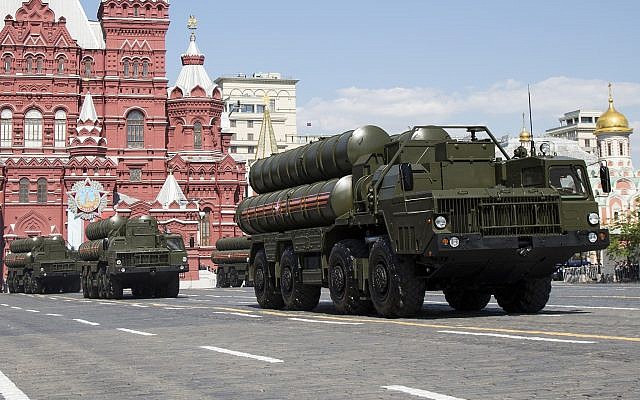Military source tells state news agency Damascus also given 300 guided missiles to arm the high-tech air defense system

Russia provided the advanced S-300 air defense system to Syria’s military free of charge, transferring three battalions with eight launchers each to the Assad regime, Russia’s state news agency TASS reported Monday.
“On October 1, three battalion sets of S-300PM systems of eight launchers each were delivered to Syria,” a military source told the agency.
“These systems were previously deployed at one of the Russian aerospace forces’ regiments which now uses the S-400 Triumf systems. The S-300 systems underwent capital repairs at Russian defense enterprises, are in good condition and are capable of performing combat tasks,” he said.
The source added that the systems were provided free of charge, along with 100 surface-to-air guided missiles for each battalion, 300 in all.
Israel’s ties with Moscow have become strained over Russia’s recent delivery of the S-300 to Syria. Israel and the US are concerned the delivery of the system could complicate ongoing Israeli efforts to prevent Iran from deepening its military presence in Syria and transferring weapons to Hezbollah.
Russia’s delivery of the the S-300 system to Syria follows the downing of a Russian spy aircraft by Syrian forces that were responding to an Israeli strike over Syrian airspace. Russia has blamed Israel for the incident, which killed 15 Russian crew members.
Although Putin initially told reporters that the incident was due to a “chain of tragic accidental circumstances,” the Russian defense ministry later declared Israel was responsible, saying the IAF jets used the Russian plane as cover.
Israel and its allies for years have lobbied Russia not to give Syria and other regional players the S-300 system, arguing that it would limit Israel’s ability to neutralize threats, including by the Lebanon-based group Hezbollah.
The S-300 system, considered one of the most advanced in the world, has a radius of some 200 kilometers, meaning a battery placed near Damascus would cover much of Israel.
Last Thursday, US General Joseph Votel, who heads the US Central Command, called the Russian S-300 deployment in Syria a “needless escalation.”
Moscow has reportedly been working to open avenues of communication between Jerusalem and Tehran to reduce tensions and friction in Syria. Citing a senior Russian source, the London-based Arabic daily Asharq Al-Awsat reported Saturday that this came in light of Moscow’s decision to provide the Assad regime with the S-300.
As reported by The Times of Israel
